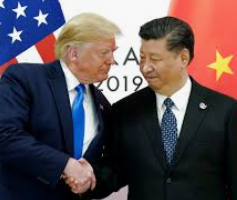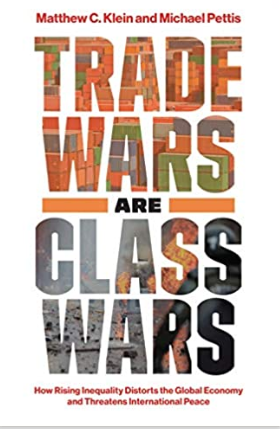
Promoting the elite at the expense of the workers


Trade conflicts caused by governments promoting the interest of the elite at the expense of workers. Across the world, the rich have prospered while workers can no longer afford to buy what they produce have lost their jobs, or have been forced into higher levels of debt. The class wars of rising inequality are a threat to the global economy and international peace and what we can do about it.
Trade Wars is a conflict between bankers and owners of financial assets on one side and ordinary households on the other- between super-rich and everyone else.
Kelin and Pettis reveals what has been happening to trade and finance, with severe global imbalances, unsustainable debts, and monstrous financial crises,
For decades real borrowing costs have been below long term forecasts of real economic growth and remain around zero. This very fact of low real interest rates with weak global demand and underconsumption is due to saving glut.
The overall balance in goods and services is explained by savings investment and capital flows, not by bilateral trade balances.
Trade Wars are class wars, discuss the history of world trade, the role of liberalised finance in creating unsustainable capital flows, and show how savings, investment, and ext4ernal imbalances interact by discussing the history of China, Germany and the US over the past three decades.
The economic success of China as a result of an extreme version of the high savings model of development combined with exploitation of trade opportunities that Japan pioneered.
There was a sharp decline in the share of household consumption in China’s gross domestic product.
Even in 2018, China consumes less than 40 per cent of its output – a lower ratio than in every other major economy in the world.
The high household savings, low-interest rates and lack of rights of rural migrants in cities, regressive taxation weak society nets, and the failure of state-owned companies to pay dividends all designed to shift income from workers and retirees to companies and the state.
Gross savings reached a peak of close to 50 per cent of GDP until the global financial crisis these savings, however, went into domestic investment and the current account surplus. After the crisis, the decline in the surplus on the current account the balance on trade in goods and all services was offset by a further huge increase in credit-fuelled investment, which surpassed nearly half of GDP. The surge in investment was funded by a large credit boom.
Germany since the end of the post-unification boom of the 1990s and the labour market liberalisation of 2000, corporate profits have been high and domestic corporate investment weak. In Germany consumption did not grow at all between 2001 and 2005. Domestic spending fell far behind trade fuelled income.
Trade Wars Are Class Wars: How Rising Inequality Distorts the Global Economy and Threatens International Peace by Matthew C Klein and Michael Pettis, Yale University Press £20, 288 pages.
